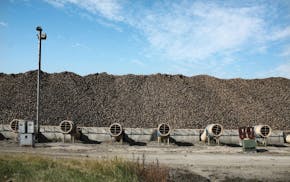Cargill, Inc. has asked a federal court to overrule a judicial decision that linked the company to child slavery in the cocoa industry.
Three men claim in the suit that they were abducted as children from Mali and forced to work on cocoa farms in the Ivory Coast, where Minnetonka-based Cargill buys many of the cocoa beans it distributes to the chocolate industry and processes itself.
Cargill, Nestlé USA, Inc. and Archer Daniels Midland Company are all named as defendants in the suit, which says the companies' control of the cocoa market forces farmers to lower production costs, which encourages employment of child laborers, including youngsters forced to work against their will without pay.
In a 2-1 decision, a three-judge panel of the Ninth U.S. Circuit Court of Appeals found that Cargill, Nestlé USA and Archer Daniels Midland could be sued under the U.S. Alien Tort Statute for aiding and abetting child slavery in violation of international law.
Now, Cargill wants the entire Ninth Circuit to overrule that decision, saying it "leaves the law deeply confused." In an e-mail to the Star Tribune, the company stressed that it does not own or operate any cocoa farms.
"Cargill is concerned about the safety and well-being of children who may be involved in dangerous or forced work on cocoa farms, and we are committed to working toward a cocoa supply chain where no children are subject to these conditions," the e-mail said.
The lawsuit is part of an ongoing battle between corporations and human rights activists, said Steven Swanson, an international law expert at Hamline University law school in St. Paul. "This is a really important case. There is no reason for blanket exclusions from liability for violations of human rights."
Experts say the suit's chances of success are slim, given a recent U.S. Supreme Court decision that sharply limits responsibility of U.S. companies for human rights violations in foreign countries. Cargill says the current suit does not allege abuse at specific farms with which the company does business.
Regardless of what happens to the current lawsuit, which includes claims of starvation and beatings, future litigation and information campaigns focused on bad treatment of workers will continue, said Irit Tamir of Oxfam America, a human rights advocacy group.
Tamir thinks United Nations guidance and international law are evolving toward increased corporate responsibility.
"Companies like Cargill are going to be held more and more accountable for human rights violations within their supply chains," she predicted.
Cargill declined to talk about the Ivory Coast case specifically but pointed to its "Cocoa Promise," an action plan launched in 2012 that has so far included millions of dollars spent to increase productivity and sustainability among cocoa farmers. Under the program, farmers receive certifications that entitle them to higher prices in exchange for abiding by certain behavior, including restrictions on child labor, outside inspections and prohibitions on forced labor.
"Farmers who comply with certification standards earn more, allowing them to invest more in their families, farms and their future," a Cargill spokesman said in an e-mail. "Increased earnings should in turn reduce the amount of assistance that farmers need from their children, allowing them to spend more time in school and less in the fields."
Cargill says that since 2012, it has trained 115,000 farmers, set up 2,550 farmer field schools, certified 77,000 farmers in productive cocoa farming practices and "improved access to education for over 34,000 children and health care for over 25,000."
While progress is being made, the U.S. Department of Labor says a 2013 report by the Ivory Coast government "shows that more than 1.6 million children, or 73.3 percent of the estimated 2.13 million children working in agriculture, domestic service, mining, transportation, and commerce in stores, markets, and on the street, are involved in the worst forms of child labor." That number included an estimated 97,700 children forced to work against their will and without pay.
How much responsibility U.S. companies have for those children is the issue under debate.
Ramifications for U.S. firms
Merely knowing about human rights violations does not make a business legally responsible for them, courts have ruled. The U.S. Supreme Court has said human rights violations must have "a substantial link to American corporations" to justify legal liability under the federal Alien Torts Statute, said Barbara Frey, director of the Human Rights Program at the University of Minnesota.
Civil procedure required the three-judge panel in the Ninth Circuit case to look at the facts "in the light most favorable" to the three men who sued. The panel decided that "the prohibition against slavery is universal and may be asserted against the corporate defendants in this case."
Giving the former child slaves the benefit of the doubt, the panel also concluded that Cargill, Nestlé USA and Archer Daniels Midland were "[d]riven to reduce costs in any way possible" and "allegedly supported the use of child slavery, the cheapest form of labor available."
With or without a verdict, this case could have ramifications for Minnesota's other multinational corporations that do business in countries with human rights problems, Hamline's Swanson said.
"In the long run," he said, "companies need to be concerned with publicity. If I was a planner for a company, I would be concerned about suits like this."
Jim Spencer • 202-383-6123
More cows are being tested and tracked for bird flu. Here's what that means
Oracle's Larry Ellison says planned Nashville campus will be company's 'world headquarters'
Stock market today: Tesla cruises higher as most of Wall Street drifts in mixed trading
Meta more than doubles Q1 profit but revenue guidance pulls shares down after-hours
